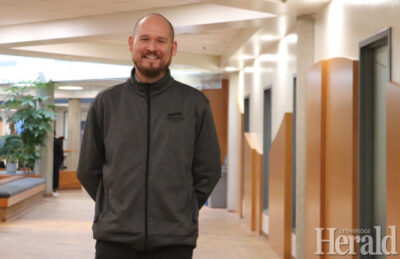College researcher looking behind the numbers in criminal justice
By Alejandra Pulido-Guzman - Lethbridge Herald on January 6, 2023.
 Herald photo by Alejandra Pulido-Guzman
Justice Studies chair Gary Barron will be conducting a study to examine how numbers related to crime and justice enter popular discourse.
Herald photo by Alejandra Pulido-Guzman
Justice Studies chair Gary Barron will be conducting a study to examine how numbers related to crime and justice enter popular discourse.LETHBRIDGE HERALDapulido@lethbridgeherald.com
Thanks to a grant received from the Centre for Applied Research, Entrepreneurship and Innovation (CARIE) a Lethbridge College study will examine how numbers related to crime and justice enter popular discourse.
Chair of the Justice Studies – Bachelor of Applied Arts, Gary Barron, will be conducting Justice by Numbers: The Politics of Quantification and Statistics in the Canadian Justice System, a study to be implemented during the winter semester.
The study is a continuation of a project Barron began in the 2021-22 academic year called Quantifying Justice: Metrics and Ethics in Canadian Criminal Justice, which involved a literature review on the sociology of quantification regarding crime, policing and justice.
“The interest grew out of my doctoral research where I developed a proposal to explore quantification and metrics in various institutions of society,” said Barron.
He said that in his early work he focused on university rankings, having performance metrics and those sorts of things and now that he is at Lethbridge College, he wanted to expand that work and look at metrics and quantification in society around justice.
“What I’m going to start doing this semester is looking at how the public engages with some metrics around criminal justice like the crime severity index, which is one big area that annually journalists, mayors and everybody starts commenting on,” said Barron.
He said he is working with student researchers and this term they are going to start doing a big search through different forms of media in Canada, from various different publications to see what numbers come into the public interest, how people comment on it, and what authorities do around that.
“Does it lead to any organizational changes? Does it just lead to people saying don’t believe those numbers because their numbers are better? Those sorts of things,” said Barron.
He said he believes quantifiable data is important because people trust numbers.
“There are ongoing debates around this. Numbers are influential, they’re powerful and people believe numbers,” said Barron.
He said that sometimes people trust numbers more than they trust people or organizations, and they use numbers to keep others accountable.
“Currently my focus is to do a broad environmental scan and see what else is out there, what is of interest to people and how people are working around them, but I have a couple more areas of interest,” said Barron.
In the second phase of his ongoing research project, Barron is focusing on the potential creation of a set of categories that police organizations will be required to collect as part of Statistics Canada’s Uniform Crime Reporting Survey on Indigeneity and racialized identity.
“There is now going to be a requirement to collect racial and Indigenous identity data so that’s new and it’ll be very interesting and so I am curious to see how that shapes, not only public conversations around what the police do, what the justice system is doing, if it is marginalizing people, or is in favour of certain people, is there any inequalities?”
He said he is also looking into the possibility of working with a police service to track its implementation of, and results from, a public perception survey.
Barron said the funding received will be used throughout the winter semester, but he will be applying for more grants, internal and external, in the future to continue his research.
Follow @APulidoHerald on Twitter
19-18





Wonderful. So in the name of equality, we are going to start identifying who’s is committing crime by racial identity. Which is the opposite of equality. Will lead to inequality and division. But, the experts know. (Nothing).